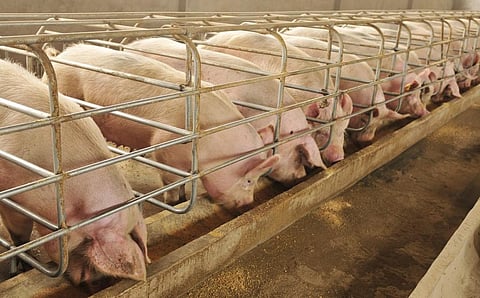

The Kerala government has stepped in to help pig farmers in the state in the wake of an outbreak of African swine fever in Wayanad district. It has started efforts to purchase all medically stable pigs in the state at the prevailing market rate, to slaughter and pack them for export.
It has done this after complaints by farmers and slaughterhouses that they had suffered losses due to adverse campaigns in the face of the detection of cases in Wayanad.
Read Down To Earth’s coverage of African swine fever
Koothattukulam-based state-owned Meat Products of India will procure the pigs and facilitate the export of scientifically processed meat. It will first purchase all pigs in Wayanad and procure animals from other districts later.
Kerala currently has a stock of 100,000 pigs, according to state veterinary minister J Chinchurani. Wayanad, the ground zero for the current outbreak, is the hub of pig rearing in Kerala and has 244 farms. These farms house 6,454 matured pigs and 4,740 minors.
An owner will get a compensation of Rs 15,000 if matured pigs are culled after detection of African swine fever. For the minors, the maximum compensation will be Rs 5,800.
The government hopes its plan would be a significant relief for farmers.
The outbreak of African swine fever in Wayanad district is likely to devastate pig populations and the farmers who rear them, according to veterinary experts. But it would not affect human health.
“It does not affect human health. But it will devastate pig populations and the farming economy,” veterinary expert Arun Zachariah told this reporter.
What actually happened?
The Kerala government decided to go in for mass culling of pigs July 22, 2022, after African swine fever cases were reported among 360 pigs in two breeding farms at Thavinjal village in the Mananthavady taluk of Wayanad district.
The culling of the affected pigs was completed late on the night of July 24, under the supervision of a dozen experts from Bengaluru.
Senior veterinary surgeon S Dayal who supervised the culling operations, said the carcases were buried in five massive pits about 80 metres away from the respective farms.
Culling will be initiated next week on three other farms in Wayanad, where the viral disease has been confirmed. The district administration has declared a one-km radius infection zone in all these places and restricted entry there.
Wayanad district collector A Geetha told this reporter that investigations were on to trace how the disease reached the two pig farms in Mananthavady taluk.
Health authorities suspect people from North East India, Bihar, and West Bengal, who work as labourers in Wayanad’s pig farms, might have turned carriers of the virus.
Many who work in the farms have visited Assam, Bihar, West Bengal and Nagaland in the last two months. These states are reporting large-scale African swine fever cases.
The virus might have reached Kerala through the dress and footwear of the farm workers, officials suspect.
“The virus is highly resistant in the natural environment, meaning it would survive on clothing, footwear, vehicle parts and other materials. The fever can also survive in pork products, such as ham, sausages, or bacon,” Zachariah said.
He said precautionary measures such as intensive cleaning, disinfection and sanitisation work should be undertaken on farms that have reported the cases.
“We have taken all precautionary measures to prevent the spread of the disease,” Geetha said. She added that all farm owners have been advised to ensure minimum human contact with pigs.
“The advisory has been issued as a precautionary measure and there is a minimal chance that humans are affected by the African swine fever,” she added. She also said cooked pig meat was safe for consumption.
Kerala has also banned the transportation of pigs and pig meat from outside the state.
The Kerala Veterinary and Animal Sciences University has started a massive awareness campaign to educate pig farmers on the disease. It has also taken steps to enhance bio-safety measures at the University pig farms at Mannuthy in Thrissur and Pookode in Wayanad.